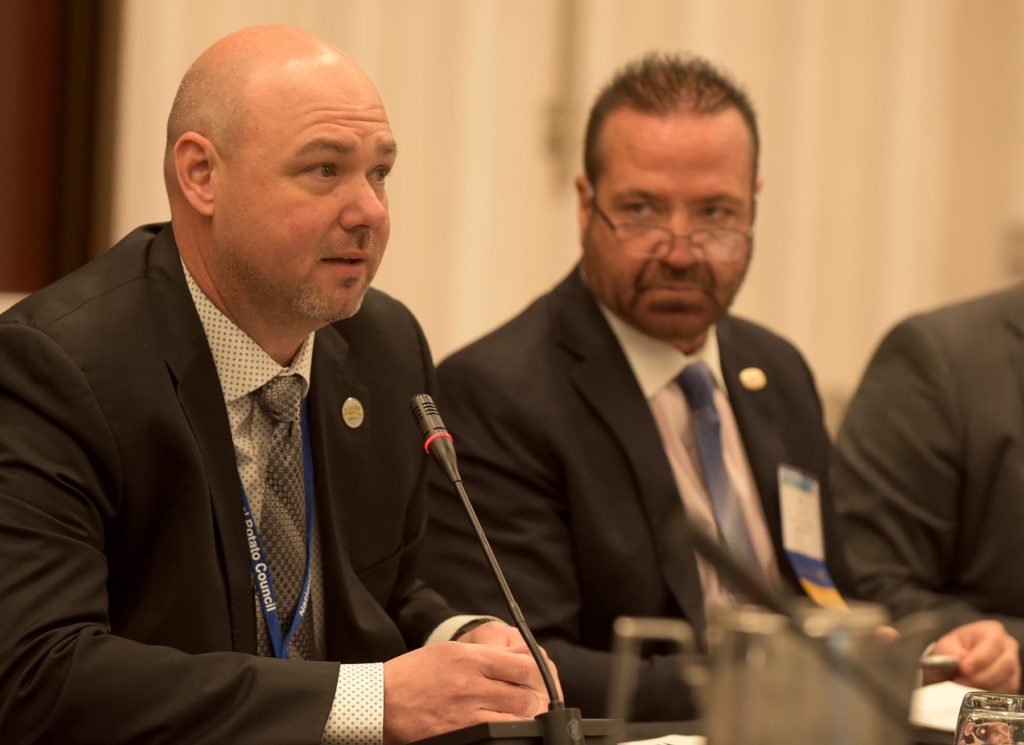
APHIS’s Shea: No additional avocados from Mexico until potato situation resolved
This is a recap from the National Potato Council’s (NPC) 2022 annual meeting, which took place March 1 in Washington, D.C.
Trade Affairs Committee
The major talking point during the Trade Affairs Committee meeting was the delay on fresh U.S. potatoes being shipped throughout Mexico. The National Potato Council was under the impression that, following a satisfactory inspection visit by Mexican officials to Colorado in December, that all systems were a go and shipments could begin as early as early February.
The Mexican government then let the USDA’s Animal and Plant Health Inspection Service (APHIS) know that they wanted to inspect potatoes as they were being grown. Since the potatoes that were to be shipped were already in storage from the 2021 harvest, things would have to wait until they could inspect this year’s crop on site.

APHIS Administrator Kevin Shea joined the NPC meeting through a video call.
“We are still hashing out issues on potatoes already available,” Shea said. “In theory, they are outside the deal we agreed upon.” There also are hang ups with additional processing potato access, which accounts for about 25% of the potatoes in question.
Shea added that APHIS is working on a compromise with its Mexican counterpart agency. He added that the goal is still to get U.S. potatoes further into Mexico as soon as possible. “We don’t want to cut our nose off to spite our face.”
RELATED: Members of Congress urge USDA to pressure Mexico
Matt Lantz of Bryant Christie, a longtime trade correspondent for the NPC, stressed to Shea that the struggle for fresh access to Mexico spans more than 20 years. He added that more access to Mexico for avocados exports has been closely linked to the potato situation and that the U.S. has come through on its part long ago by granting access for more Mexican avocados. Shea responded the U.S. is firm on additional avocado access.
“We won’t be moving on additional avocados until we are sure potatoes are going to Mexico,” Shea said. Lantz noted it was the first time the U.S. government had made that strong of a verbal commitment.
Another big topic discussed was when to allow potatoes from Prince Edward Island to the U.S. after imports were suspended following multiple positive tests for potato wart in PEI fields. The U.S. did start allowing tablestock potatoes from PEI to resume shipment to Puerto Rico recently. They are marked “for consumption only” to discourage planting, as well as any attempt to move potatoes to the U.S. mainland for resale.
PEI committed to ramp up its potato wart testing, which had declined in recent years. About 10% of the planned additional 30,000 soil tests — which is 300% more than at any point in the past — have already been processed. Said NPC CEO Kam Quarles: “Our message has been to do the testing and then clear the (afflicted) fields.”
Shea said APHIS is a “long way” from allowing PEI seed potatoes to the continental U.S. He added that tablestock potatoes are going to be closely monitored because “people could still theoretically plant them. We have to look at this very hard. We will make our decision on risk analysis and the best science available to us.” (Since the NPC meeting took place, a third positive test for potato wart in PEI fields was confirmed by Canadian officials.)
On other fronts, Lantz said efforts are ongoing to get fresh U.S. potatoes into Japan, but will take time. “It’s going to be a political fight, like Mexico, but lighter,” he said.
Also, a potential maximum residue level (MRL) problem with South Korea involving maleic hydroxide, a sprout inhibitor, was avoided recently. South Korea did not have an MRL level for maleic hydroxide-treated potato products from the U.S. Had residue been found without an MRL, it could have caused significant problems with exports to the country.
With extensive work from Lantz, the South Korean government has agreed to speed up the MRL process to avoid any disruptions.
“Matt has really done (strong work),” Quarles said. “It looked like this was going to be unresolvable.”
NPC President Jared Balcom said the organization plans to form an MRL subcommittee to help assure such situations are minimized in the future.
New Trade Affairs Committee Vice President Ted Tschirky of Washington led the meeting. Tschirky was previously the VP of Grower Outreach and Industry Research.
Highlights of Trade Affairs Committee
Highlights of Grower Outreach & Industry Research Committee meeting
Highlights of Finance Committee meeting
Top photo: Jared Balcom, left, 2022 National Potato Council President, speaks as RJ Andrus, VP of Legislative Affairs listens during the NPC’s 2022 annual meeting in Washington, D.C. Photo: Bill Schaefer Photography














